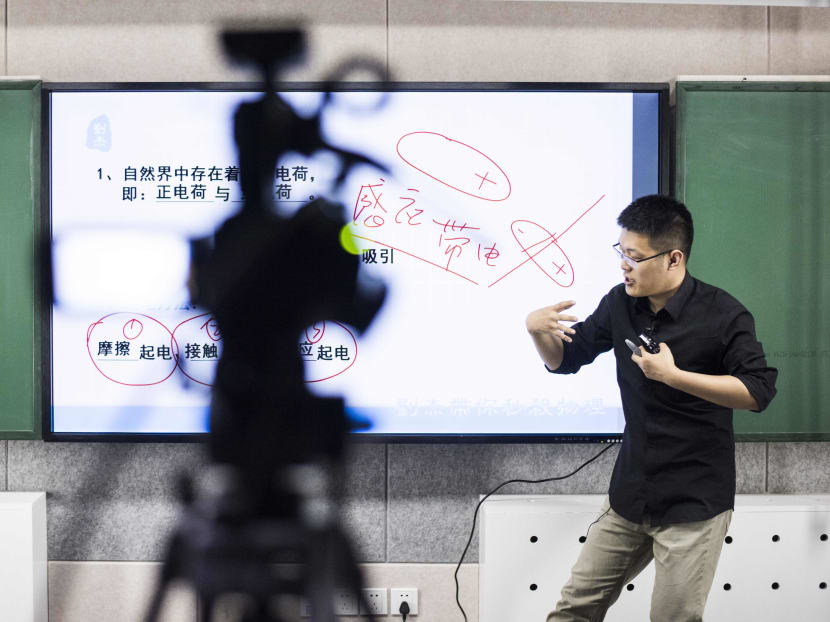Cash Kao: China’s tutors earn fortunes online
BEIJING — With a following of several million teenage fans, China’s Liu Jie says he can earn nearly US$50,000 (S$67,841) a month from his online videos and is often recognised on the street. But he is no pop star.

Chinese high school physics tutor Liu Jie gives an online lesson from a recording studio in Beijing. Photo: AFP
BEIJING — With a following of several million teenage fans, China’s Liu Jie says he can earn nearly US$50,000 (S$67,841) a month from his online videos and is often recognised on the street. But he is no pop star.
A high school physics tutor, Mr Liu belongs to a growing cohort of educators feeding the country’s insatiable demand for after school online study.
The industry is fuelled by the vast number of Internet users in China — the most in the world — combined with the annual university entrance exam, a national obsession that decides the fate of millions.
The gruelling two-day “gaokao” begins on Tuesday (June 7), with police set to cordon off streets to ensure silence for students.
“Because the gaokao is such a huge deal in China ... That’s where the main demand is,” said Mr Liu, fresh from recording a lecture on static electricity.
Wiry and bespectacled, Mr Liu was a private tutor before he began filming lessons for an online platform that sells them to hungry students.
His page on the platform shows a graduation certificate from China’s top science university, while adverts of him appearing pensive appear elsewhere online.
“Often people recognise me on the street, a parent recognised me just now,” said Mr Liu.
“Students will often pursue a teacher like they pursue celebrities.”
When he reached the limit of 5,000 friends on social media platform Wechat, he added another account which quickly gained 3,000 more, mostly parents and students.
‘TOTALLY UNEXPECTED’
The almost unlimited size of an online classroom means that top teachers can earn a fortune.
He whips out his iPhone, using the calculator to show how even relatively low fees of around ¥250 (S$52) per class generate massive revenues from paying audiences that can reach tens of thousands.
He can earn up to ¥300,000 each month ahead of the exam, he said, generating an annual income of about ¥2.8 million yuan — more than 30 times the standard wage of a high school teacher in Beijing.
“I didn’t think I could make so much money, it’s totally unexpected,” he said. “Teaching has always been seen as a poor profession.”
China has long had the world’s largest number of Internet users — now more than 650 million — but the rise of smartphones has pushed online courses into the mainstream.
Reports of teachers making millions each year from such courses showed online teaching was “in the ascendent” said Mr Xiong Bingqi, vice president of independent think tank 21st Century Education in Shanghai.
“Teachers earning more than other online celebrities shows their abilities and the choices of consumers,” he said.
LOYAL FAN
Ahead of the gaokao, high-school students study from soon after dawn to well beyond sunset.
In 2012, the nation was shocked when it emerged that one school had provided students with intravenous drips of amino acids to give them strength to continue working.
Mr Cao Wei, an online mathematics tutor begins live-streaming his classes at 11pm, often to an audience of several thousand.
“I’ve shed more than seven pounds in the last two months,” he said of his late-night schedule.
But he can earn some ¥80,000 each month catering to teenagers drawn to his straightforward approach.
“He’s different than teachers at school. They are often long-winded, Cao is more simple,” 17-year-old high school student Li Jiayao said.
“I am his loyal fan.”
Celebrity teachers are not unique to mainland China. In South Korea, online cram school tutors can earn as much as US$8 million each year.
Hong Kong is home to television celebrity tutor kings and queens who also rake in huge sums.
But as the popularity of online tutoring soars in China, authorities seem concerned that school teachers may abandon the classroom for greener pastures online.
An education ministry official told state media in March this year that school teachers moving to Internet education might “affect their ordinary classes”, but added such moves would not be banned.
In the face of rampant online piracy, Mr Liu said that he must keep his material fresh to maintain his following.
“Online pressure is very big. If you’re not active for a couple of weeks, people will quickly forget you.”
“It’s very similar to being a celebrity.” AFP





